| Srl | Item |
| 1 |
ID:
176158
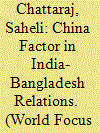

|
|
|
|
|
| Summary/Abstract |
The South Asian region is one of the least economically integrated regions in the world. Intra-regional trade remains well below its potential due to high transport costs, protectionist policies, and political tensions. The South Asian Association for Regional Cooperation (SAARC) agreements, the South Asian Preferential Trading Arrangement, and the South Asian Free Trade Arrangement, have failed to break down trade barriers.
|
|
|
|
|
|
|
|
|
|
|
|
|
|
|
|
| 2 |
ID:
134049
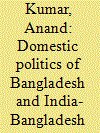

|
|
|
|
|
| Publication |
2014.
|
| Summary/Abstract |
The foreign policy of a country generally changes incrementally but in the case of Bangladesh it changes dramatically towards India depending upon which political party or alliance is in power. The ideological cleavage prevailing in the country affects not only its domestic politics but also its relationship with its neighbour India. In this article an attempt has been made to explain why and how the domestic politics of Bangladesh affects India-Bangladesh relations. It explores some of the historical processes that resulted in the formation of community consciousness among the Bengali Muslims. It also discusses the interests of different sections of society, such as the army and traders, who influenced the country's foreign policy in the post-liberation period as well as those who actively participated in the Liberation War of Bangladesh and who are pro-peasant and friendly to minorities. In this article the focus is on the domestic politics of Bangladesh. The main argument is that since there is no consensus in Bangladesh over how to best serve its national interest, the foreign policies of the two major political parties are completely different and allow the domestic politics of Bangladesh to affect the bilateral relationship with India in a way that is mostly independent of India's actions. It also suggests that India can only be insulated from Bangladeshi domestic politics after the delegitimisation of anti-liberation forces in Bangladesh, which could happen with the successful completion of the war crime trials.
|
|
|
|
|
|
|
|
|
|
|
|
|
|
|
|
| 3 |
ID:
142124
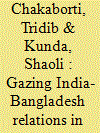

|
|
|
|
|
| Summary/Abstract |
The thumping victory of the 2014 Lok Sabha Election gave Modi a better space to initiate Act East Policy with Bangladesh. Within this short span of time, his gesture towards the Bangladesh government remains quite constructive in its entirety. One of the prime goals of current NDA government was to ‘Make in India’ where inviting foreign investment remains the core idea. To implement this, India needs better connectivity with its immediate neighbors, where Bangladesh, Myanmar and North-Eastern states are directly connected and Nepal and Bhutan are indirectly connected. This connectivity constitutes the major component of India’s current Act East Policy, where economic improvement of the North-Eastern region also remains a prime segment. It is too early to evaluate the current NDA government’s performance with the past government, because both initiated better ties with Bangladesh. However the current trend of Modi’s outlook towards Bangladesh is way ahead of its predecessor. This positive outlook of India was evident from the speech delivered by Prime Minister Narendra Modi, at Dhaka on 6 June, 2015, where he said: “We are not just neighbours. We are two nations bound by the threads of history, religion, culture, language and kinship - and, of course, passion for cricket….We will work together to harness the rich potential of our relationship. And, we will address our challenges in a spirit of friendship and from a position of mutual trust and confidence”.This is no doubt a major pragmatic shift of India’s Bangladesh policy in recent times under NDA government and it is hoped that it would perform much better than the past years and also for the come days.
|
|
|
|
|
|
|
|
|
|
|
|
|
|
|
|
| 4 |
ID:
176154
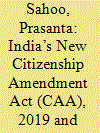

|
|
|
|
|
| Summary/Abstract |
India’s newly enacted Citizenship Amendment Act (CAA), 2019 and the National Register of Citizens (NRC) has put the most trusted India-Bangladesh relations on the test. Though both the neighbours share a largely cordial relationship with a shared history, culture, and a common destiny, the recent law has brought serious stress in the bilateral relations.
|
|
|
|
|
|
|
|
|
|
|
|
|
|
|
|
| 5 |
ID:
141364


|
|
|
|
|
| Summary/Abstract |
[T]he two countries at present share cooperative bilateral relations and there is a great degree of mutual understanding regarding the mutual aspirations. India’s Development Partnership Agreement with Bangladesh in 2011, underpins economic aspirations of the two countries away from the security centric approach that had once governed the bilateral relations.
Though the Teesta issue appears to be the stumbling block at this moment, West Bengal Chief Minister Mamata Banerjee's assurance on the Teesta issue is likely to pave the way for future resolution perhaps after the State Assembly poll. Unlike the past, India has a willing partner in Bangladesh that is not hesitant to engage its bigger neighbours in a mutually beneficial relationship and appreciative of the fact that their common future lies in greater cooperation. India needs to grab this opportunity and ensure that this relationship benefits Bangladesh as a true partner that dared to dream of a common destiny with a large neighbour.
|
|
|
|
|
|
|
|
|
|
|
|
|
|
|
|
| 6 |
ID:
166045
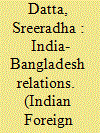

|
|
|
| 7 |
ID:
166046


|
|
|
| 8 |
ID:
169437


|
|
|
|
|
| Summary/Abstract |
Though India-Bangladesh relations have been cordial thoughoften foundunder the shadow of misunderstandings, suspicion and hates. The fall of Mujibur regimemarked the watershed in India-Bangladesh relations. Meanwhile, theresolution of boundary disputes andother initiatives has broughtchanges in bilateral perceptions. Furthermore, bound by a common destiny, Bangladesh’s political and geostrategic importance has increased toomanyfolds in the present world order, due to itscloseproximity to India and China.
|
|
|
|
|
|
|
|
|
|
|
|
|
|
|
|
| 9 |
ID:
148576


|
|
|
|
|
| Summary/Abstract |
Finalizing the ratification of Land Boundary Agreement (2015) is like falling of the “Berlin Wall” between India and Bangladesh which is considered as the golden chapter in their bilateral relationships. The new regimes in Delhi and Dhaka under the leadership of Narendra Modi and Shaikh Hasina respectively have taken the friendship to the highest peak. This is the biggest icebreaker since Indira-Mujib treaty of early 70s. Bangladesh occupies a very important place in the calculation of India’s foreign policy discourse vis-à-vis South Asia. Today, India and Bangladesh are strategic partners in the war against terrorism. They are also largest trading partners in South Asia.
|
|
|
|
|
|
|
|
|
|
|
|
|
|
|
|
| 10 |
ID:
176152


|
|
|
|
|
| Summary/Abstract |
India is all set to become a super power. America is shrinking, China is rising. It is hoped that after Covid-19, India will grow in (Tick mark) way but definitely not in the V shape as told by some experts. If India grows in this fashion, it will be touching something around 9 to 10 percent annual growth and that will make India Economic Super Power.
|
|
|
|
|
|
|
|
|
|
|
|
|
|
|
|
| 11 |
ID:
133898
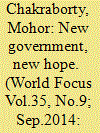

|
|
|
|
|
| Publication |
2014.
|
| Summary/Abstract |
An assessment of the foreign policy balance-sheet of the United Progressive Alliance (UPA) administration reveals its ineptitude in resolving the issue of water-sharing of the Teesta River with Bangladesh, the legacy of which has been inherited by its successor, the Bharatiya Janata Party (BJP) Government, under the leadership of Narendra Modi, who adorned the Prime Minister's Chair on 26 May 2014. The legacy of this contentious bilateral issue can be traced back to the Second Phase of the UPA administration (UPA-II) in 2011, when the Chief Minister of the Indian state of West Bengal, Mamata Banerjee refused to budge on her decision of not sharing the Teesta river water with Bangladesh.
|
|
|
|
|
|
|
|
|
|
|
|
|
|
|
|
| 12 |
ID:
155631


|
|
|